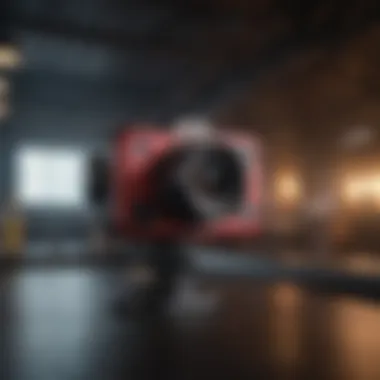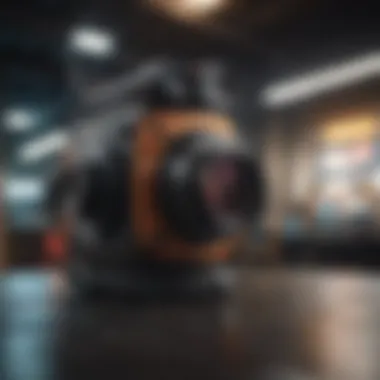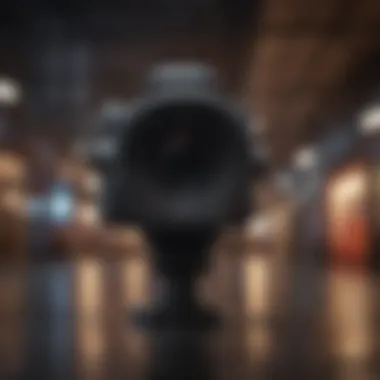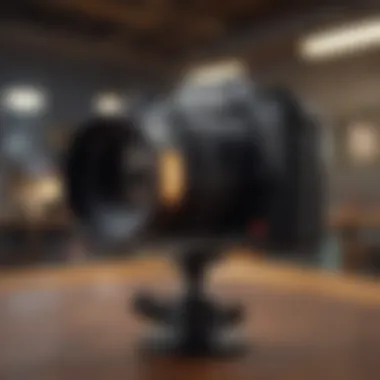Discovering the Finest Low Light Webcams for Enhanced Video Quality


Overview
In the realm of video communication and content creation, the importance of high-quality visuals cannot be overstated. Especially in dimly lit environments, the performance of a webcam becomes crucial in maintaining video clarity and sharpness. This article navigates the landscape of low-light webcams, shedding light on the top contenders equipped with cutting-edge sensor technologies and superior image processing capabilities.
Features & Specifications
As we delve into the technical intricacies, it becomes evident that these low-light webcams excel in a myriad of features and specifications. From larger pixel sizes to sophisticated noise reduction algorithms, these webcams are tailored to produce exceptional video quality even in challenging lighting conditions. The superior sensor technologies employed ensure enhanced light sensitivity, resulting in clearer and more vibrant images.
Pros and Cons
When evaluating the pros and cons of these low-light webcams, several key aspects come to light. On the positive side, the enhanced low-light performance and superior image quality set these webcams apart from their counterparts. However, drawbacks such as potential compatibility issues with certain software or the need for optimal lighting conditions to achieve the best results are important considerations for prospective buyers.
User Experience
Real-world user experiences offer valuable insights into the performance of these low-light webcams. Customers have praised the exceptional video quality and low-light capabilities, highlighting how these webcams have elevated their communication and content creation experiences. Some users have expressed minor concerns about setup complexities or software integrations, but overall, the feedback has been overwhelmingly positive.
Buying Guide
For potential buyers seeking guidance in selecting the ideal low-light webcam, performance, value for money, and the target audience are key factors to consider. Recommendations tailored to individual needs, whether for professional streaming, virtual meetings, content creation, or casual use, aim to assist users in making an informed decision that aligns with their specific requirements.
Introduction to Low Light Webcams
Low light webcams have become essential tools for users seeking to enhance their video quality in dimly lit environments. As technology advances, the need for webcams that can perform optimally in low light conditions has grown substantially. In this article, we will explore the significance of choosing the best low light webcams tailored to individual needs and preferences. From ensuring clear video output in dark settings to maintaining a professional look during virtual meetings, the importance of low light performance cannot be overstated.
Understanding the Importance of Low Light Performance
Impact of Lighting on Video Quality
The impact of lighting on video quality is one of the fundamental aspects to consider when evaluating low light webcams. The ability of a webcam to capture vivid and sharp images in challenging lighting conditions is crucial for delivering a seamless visual experience. By optimizing light sensitivity and exposure, users can achieve exceptional video clarity even in dimly lit environments. The superior performance of webcams with advanced lighting features ensures a high level of detail and definition, setting them apart as preferred choices for users seeking top-notch video quality.
Need for High Sensitivity in Low Light Environments


The need for high sensitivity in low light environments underscores the importance of webcams that can effectively adapt to varying lighting conditions. Webcams with high sensitivity sensors can capture more light, resulting in brighter and clearer images. This feature is particularly beneficial for users who frequently engage in video calls or streaming activities in poorly lit settings. While enhancing image quality, high sensitivity sensors also minimize noise levels, contributing to a visually appealing video output. The seamless integration of high sensitivity technology in low light webcams ensures optimal performance in challenging environments, making them ideal choices for users prioritizing video quality above all else.
Key Features to Look For
In this section, we'll delve into the crucial aspects that make low-light webcams stand out. When scouring the market for a webcam, one should pay close attention to the sensor technology, lens quality, and image processing capabilities. These features play a pivotal role in ensuring exceptional performance in dimly lit environments, making them must-have considerations for tech enthusiasts seeking superior video quality.
Sensor Technology
Back-Illuminated Sensors
Back-illuminated sensors are renowned for their exceptional light-gathering abilities. By rearranging the sensor's structure to place the wiring behind the photodiodes, these sensors can capture more light, resulting in sharper and clearer images even in low light conditions. Their popularity stems from the increased sensitivity to light, allowing for improved performance in challenging lighting setups.
Large Pixel Size for Enhanced Light Capture
Another critical aspect to consider is the pixel size of a sensor. Webcams with larger pixel sizes have a competitive edge in low-light settings as they can capture more light per pixel. This enhanced light sensitivity translates to better image quality, reduced noise levels, and improved overall performance in dim environments.
Lens Quality
Wide Aperture Lenses
The aperture of a lens plays a crucial role in determining the amount of light that reaches the sensor. Wide aperture lenses allow more light to pass through, resulting in brighter and more detailed images. When selecting a low-light webcam, opting for one equipped with a wide aperture lens ensures better performance in dimly lit spaces.
Anti-Glare Coating for Improved Performance
To combat issues such as glare and reflections that can degrade image quality, webcams with anti-glare coatings are a standout choice. These coatings minimize unwanted light interference, enhancing image clarity and sharpness. Choosing a webcam with anti-glare coating can significantly improve performance in various lighting conditions.
Image Processing Capabilities
Noise Reduction Algorithms
Noise reduction algorithms are instrumental in mitigating visual distortions caused by low-light conditions. By intelligently suppressing noise while preserving image detail, these algorithms contribute to cleaner and sharper video outputs. Selecting a webcam with advanced noise reduction capabilities is essential for achieving professional-quality results in challenging lighting scenarios.
HDR Support for Balanced Exposure


High Dynamic Range (HDR) support is a valuable feature that ensures balanced exposure levels in varying light conditions. By capturing a broader range of light intensities, HDR-enabled webcams deliver more vibrant and true-to-life visuals. Integrating HDR technology into your webcam enhances image contrast and clarity, making it an ideal choice for users prioritizing top-tier video quality even in low light settings.
Top Low Light Webcams in the Market
Low light webcams are essential for users looking to enhance their video quality in dimly lit environments where traditional webcams may struggle. The focus on top low light webcams in the market highlights the importance of quality imaging even in challenging lighting conditions. It ensures that users can maintain clear and sharp video output irrespective of the ambient light levels. Selecting the right low light webcam can make a significant difference in video conferencing, streaming, or content creation.
Logitech C922 Pro Stream
Detailed Specifications
The Logitech C922 Pro Stream boasts impressive specifications that set it apart as a top choice in low light webcams. With a high-resolution sensor and advanced image processing capabilities, the C922 delivers crisp and detailed video output even in poorly lit environments. Its ability to capture sharp images with accurate colors ensures a professional quality video experience. The webcam's autofocus feature enhances the clarity of visuals, making it ideal for various applications where precise focus is crucial.
User Reviews and Feedback
User reviews and feedback for the Logitech C922 Pro Stream consistently praise its performance in low light conditions. Users appreciate its ease of setup and use, making it a popular choice among streamers, video conferencing professionals, and content creators. The webcam's compatibility with different operating systems and software platforms adds to its appeal, providing versatility and convenience. While some users may find the software interface slightly complex, the overall consensus is overwhelmingly positive regarding the C922's video quality and reliability.
Razer Kiyo
Innovative Ring Light Design
One of the standout features of the Razer Kiyo is its innovative ring light design, which offers built-in illumination for enhanced video quality in low light settings. The adjustable ring light provides customizable lighting options, allowing users to achieve optimal brightness levels for their video recordings or streams. This feature sets the Razer Kiyo apart, as it eliminates the need for external lighting setups and ensures consistent lighting for professional-looking videos.
Integration with Streaming Platforms
The Razer Kiyo's seamless integration with popular streaming platforms is a key selling point for users seeking a hassle-free streaming experience. Its compatibility with streaming software enhances user convenience, making it a preferred choice for gamers, streamers, and online content creators. The ability to adjust camera settings directly from the streaming platform enhances real-time customization options, improving the overall streaming quality and engagement with the audience.
Microsoft LifeCam Studio
Studio-Quality Video Output
The Microsoft Life Cam Studio is renowned for its studio-quality video output, delivering sharp and vibrant visuals even in low light conditions. The webcam's high-quality lens and sensor combination ensures accurate color reproduction and clarity, essential for professional video production and conferencing. Users appreciate the LifeCam Studio's ability to maintain consistent video quality across varying lighting conditions, making it a versatile choice for diverse applications.
Compatibility with Various Software


An advantage of the Microsoft Life Cam Studio is its seamless compatibility with a wide range of software applications, making it a versatile tool for users with specific software preferences. Whether used for video conferencing, online collaboration, or content creation, the webcam's compatibility ensures a smooth user experience without compatibility issues. This flexibility in software integration enhances user productivity and ensures a streamlined workflow in various digital environments.
Installation and Setup Tips
When it comes to low-light webcams, the installation and setup process play a crucial role in ensuring optimal performance and video quality. Properly configuring your webcam can make a significant difference in how it captures images in dimly lit environments. One key element to consider during installation is the positioning of the webcam. Placing it at the right angle and height can help achieve better lighting conditions and reduce unwanted shadows. Additionally, connecting the webcam to a stable platform or tripod can prevent unnecessary movement that may affect video quality. By carefully setting up your low-light webcam, you can maximize its potential and enjoy clear, high-quality video during your virtual meetings or streaming sessions.
Optimizing Lighting Conditions
Positioning Light Sources Effectively
Effective positioning of light sources is essential for enhancing the performance of your low-light webcam. By strategically placing lights at specific angles and distances, you can eliminate unwanted shadows and evenly illuminate the scene. This technique is particularly beneficial when dealing with challenging lighting environments, such as rooms with limited natural light or harsh overhead lighting. Properly positioned light sources can help your webcam capture clear and detailed images, providing a professional look to your video content.
Avoiding Glare and Reflections
Glare and reflections are common issues that can degrade the quality of your video feed when using a low-light webcam. To minimize these problems, it is essential to pay attention to the reflective surfaces in your environment. Positioning your webcam away from reflective objects or surfaces can help reduce glare and unwanted reflections, resulting in a cleaner and more visually appealing video output. Additionally, adjusting the angle of the camera and modifying the lighting setup can further mitigate glare and ensure a clear image for your viewers.
Adjusting Camera Settings
Exposure Adjustment
Exposure adjustment is a fundamental aspect of optimizing your low-light webcam's performance. By fine-tuning the exposure settings, you can control the amount of light that the camera sensor captures, allowing you to adjust the brightness levels of your video feed. This adjustment is particularly crucial in low-light environments where inadequate exposure can result in dark, grainy images. By carefully adjusting the exposure settings based on the lighting conditions, you can achieve well-balanced and visually appealing video footage that captures the details with clarity.
White Balance Calibration
White balance calibration is another critical parameter to consider when fine-tuning your low-light webcam settings. Proper white balance ensures accurate color representation in your video feed, preventing color casts that can distort the visual information. By calibrating the white balance settings according to the prevailing lighting conditions, you can achieve natural and lifelike colors in your videos without any color tint or imbalance. This adjustment enhances the overall quality and realism of your video content, making it more engaging and pleasing to the viewers.
Conclusion
In delving into the world of low-light webcams, the significance of closing one’s search with deliberate consideration cannot be overstated. The realm of technology offers a myriad of options, each catering to various needs and demands depending on one's preferences and resources. The conclusion segment encapsulates the essence of the exhaustive exploration of low-light webcams, urging users to make informed decisions resonating with their individual prerequisites and aspirations. This pivotal segment aids in solidifying the understanding gained throughout the article, highlighting the criticality of thoughtful selection in realizing optimal performance for one's video needs.
Choosing the Right Webcam for Your Needs
Considering Budget Constraints
Discussing the aspect of 'Considering Budget Constraints' sheds light on the vital intersection between affordability and functionality in the realm of low-light webcams. Such emphasis becomes particularly pertinent given the broad spectrum of options available in the marketplace, ranging from budget-friendly alternatives to premium selections. By emphasizing the significance of budget considerations, users are empowered to align their purchasing decisions with their financial parameters while striving for optimal performance and quality. The unique strength of integrating budget constraints into the decision-making process lies in the ability to navigate through the array of choices, strategically earmarking resources in a manner that aligns with one’s video requirements effectively. This segment unravels the advantages and drawbacks associated with budget-conscious selections, equipping readers with the necessary wisdom to balance financial prudence with technological sophistication.
Matching Features to Specific Requirements
In the pursuit of selecting the perfect low-light webcam, the focal point must invariably rest on the synergy between the device's features and the user’s distinct prerequisites. 'Matching Features to Specific Requirements' amplifies the essence of tailor-fitting technological capabilities with individual demands, assuring seamless integration and satisfaction with the chosen device. By underscoring the pivotal role played by aligning features with specific needs, users are encouraged to conduct a meticulous assessment of their video-related expectations vis-a-vis the functionalities offered by various webcam models. The unique characteristic of this approach lies in its efficacy in streamlining the selection process, ensuring a harmonious convergence of user requirements with device capabilities. This elaborate discussion encapsulates the benefits and limitations associated with feature-matching, empowering readers to make well-informed decisions amidst the sea of options available in the contemporary technological landscape.







